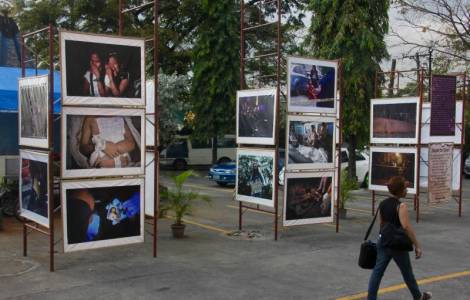
Manila (Agenzia Fides) - In the first year of presidency in the Philippines, Rodrigo Duterte and his administration "have been responsible for a wide range of human rights violations, intimidation and arrests, establishing a climate without law". This is what is stated in an note by Amnesty International recalling that on June 30, 2016 Rodrigo Duterete officially assumed the powers of president. Amnesty cites "the violent governmental drug campaign that has caused thousands of extrajudicial executions, even more than Ferdinand Marcos's murderous regime from 1972 to 1981".
"Duterte - says Amnesty's note sent to Fides - came to power with the promise of ending crime. Instead, thousands of people have been killed by, or on behalf of, a police force against the law, at the behest of a president who has shown nothing but contempt for human rights and those who defend them".
"Duterte's violent campaign has transformed the country into an even more dangerous place, has compromised the rule of law and has given its creator the reputation of a leader guilty of the deaths of thousands of its citizens", said James Gomez, Director of Amnesty International for Southeast Asia and the Pacific
In February 2017, Amnesty International had published a report denouncing how the police had become a criminal enterprise, killing most poor people suspected of consuming or selling drugs, hiring assassins, seizing the assets of people killed, placing false proofs on their bodies and remaining completely unpunished. "Duterte’s government avoids responsibilities at all levels. There are no credible investigations at a national level and there is no collaboration with the UN Special Rapporteur",said Gomez.
The same position is expressed by Human Rights Watch/HRW, which notes that President Rodrigo Duterte has "unleashed a human rights calamity in his first year in office". HRW notes "a steep decline in the respect for human rights " and recalls that the security forces and "unidentified armed men" have killed at least 7,000 suspected drug addicts since 1 July 2016, while Duterte’s administration has "rejected all national and international appeals to ascertain abuses".
"President Duterte took office promising to protect human rights, but has instead spent his first year in office as a boisterous instigator for an unlawful killing campaign", says Phelim Kine, deputy Asia director of HRW who, through field research, highlighted "unlawful police conduct designed to paint a veneer of legality over extrajudicial executions that may amount to crimes against humanity".
The NGO stresses "the contempt of Duterte government's for international law" also in an attempt to reintroduce the death penalty for drug offenses and call on the Senate of the Philippines (which has yet to decide) to reject this attempt. The Philippine NGO “Karapatan” also recalls the extrajudicial killing of 64 human rights activists and criticizes the imposition of martial law on the entire island of MIndanao, which is legitimizing military forces to implement repressive methods, torture and human rights abuses, also denounced to the Supreme Court. (PA) (Agenzia Fides, 1/7/2017)
ASIA/MYANMAR - With martial law in 37 other cities, the army is determined to "crush any resistance"